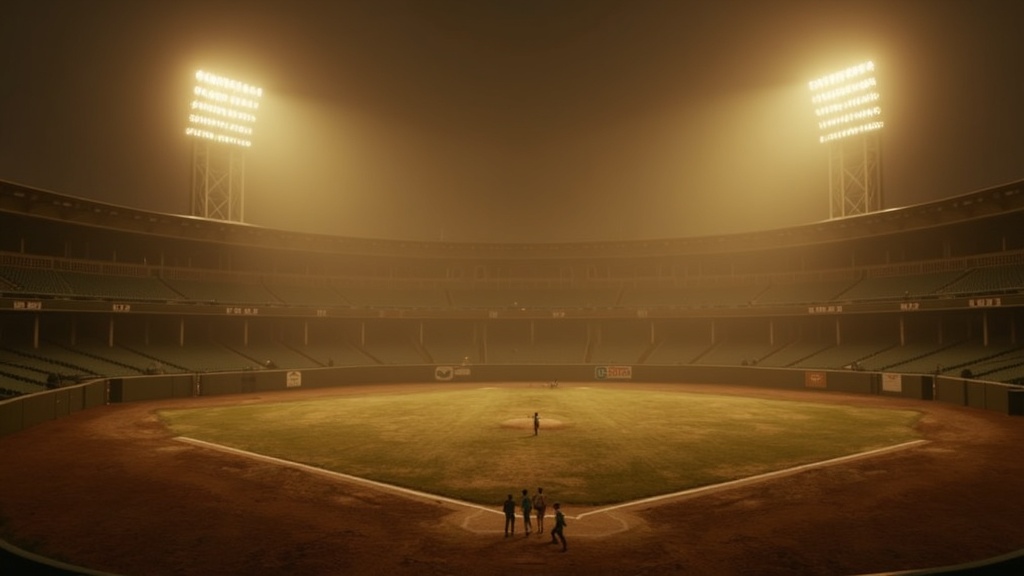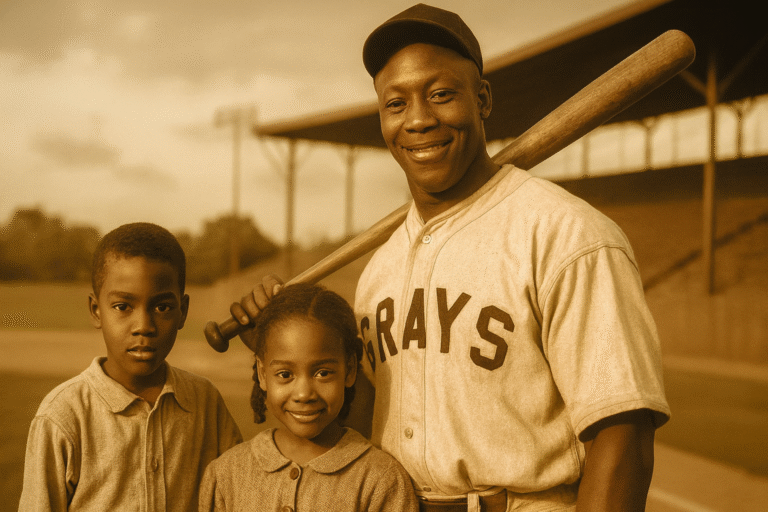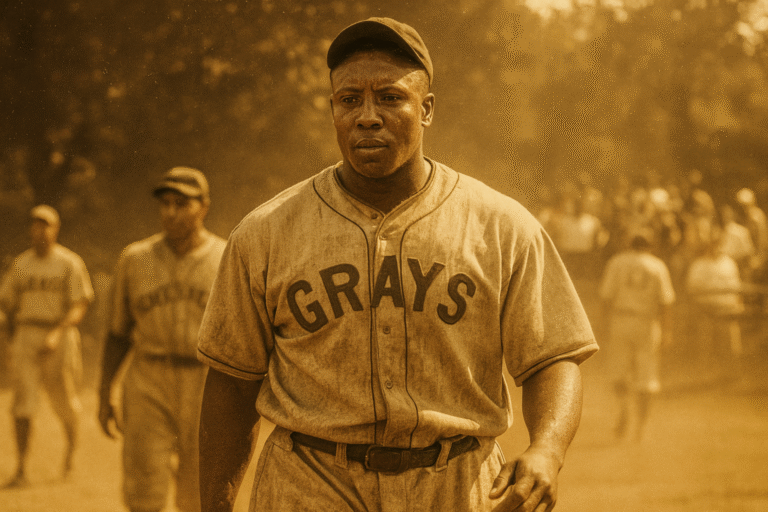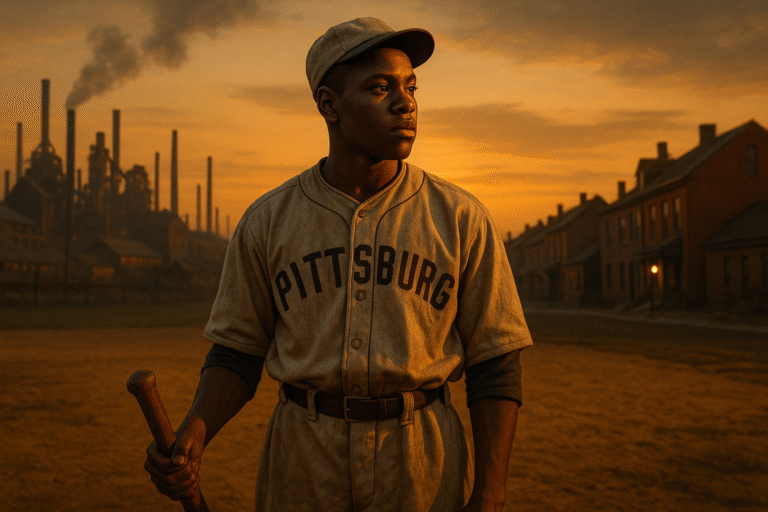Key Takeaways
- Josh Gibson redefined what power and precision meant in baseball during segregation.
- He proved that Black athletes not only belonged in the game but could dominate it.
- His performance in the Negro Leagues forced the MLB to face its own limits.
- Even without Major League stats, his legacy stands among baseball’s greatest names.
- Every record, rumor, and roar from the stands pushed baseball closer to real equality.
Josh Gibson’s Rise In The Negro Leagues
Josh Gibson’s name just carries a weight in baseball circles. He’s a figure that plenty of folks have heard about, but not enough people truly know the major impact he had, especially during his days in the Negro Leagues.
There’s a certain mix of legend and reality that surrounds his story; a guy who, if you believe the tales, could hit a ball farther than anyone alive at the time. But when you dig into his rise through the Negro Leagues, what you find isn’t just eye-popping home run numbers.
It’s someone who pushed the game forward, left a lasting mark, and honestly changed how people viewed Black baseball during a time when the sport, and the nation, was still intensely divided.

The Early Days: Checking Out a Talent Rarely Seen
Josh Gibson was born in Buena Vista, Georgia, in 1911, but it was Pittsburgh where his baseball story really got going. Growing up surrounded by a lively baseball scene, Gibson jumped in with local sandlot teams almost right away.
Ironically, he was more interested in electrical work than sports at first. Baseball seemed to find him; his raw power at the plate turned heads, and in no time, he was pulling attention from Pittsburgh’s top Black teams.
The first time I read about his early stats, I figured there must be some mistake—here was a teenager consistently sending balls over the fence against seasoned veterans. Not typical, not at all. That next-level cool swing of his is what got people talking from day one, and it just kept building from there.
Breaking Into the Negro Leagues: The Making of a Powerhouse
Gibson’s first big Negro Leagues moment came in 1930. He joined the Homestead Grays in almost storybook fashion after their main catcher got hurt midgame. Gibson was pulled from the stands and tossed right onto the field. From that day on, he never looked back.
The Grays saw the magic, and soon enough, the Pittsburgh Crawfords were also after him. The rivalry between those teams was fierce at the time. Getting a force like Gibson behind the plate and at bat transformed any club into an instant top contender.
It was this early hustle, right after being called up on pure chance, that cemented his path. Gibson quickly went from the “kid with the big bat” to one of the most talked-about sensations in all of Black baseball. Players and fans all across the map were eager to see what he’d do next. His legend grew by the game, not by the season.
Josh Gibson Negro Leagues Highlights
The stats aren’t always perfectly recorded, but the stories, local reporting, and firsthand memories fill in a lot of the blanks. That’s what’s both fascinating and a little frustrating about tracking Josh Gibson’s career. Still, here are a few moments and records that pop up again and again:
- Famous Home Run Feats: Gibson regularly put up 20 to 40 home run seasons, depending on which numbers you check.
- 340+ Batting Average Seasons: Many seasons saw Gibson hitting above .350, even breaking .400 more than once. The 1933 and 1936 seasons often stand out, with historians pointing to just how locked in he was at the plate throughout those stretches.
- Consistent Power: Most power hitters have their highs and lows, but Gibson kept knocking the ball all over the park, year after year, against any pitching thrown at him.
- Champion with Homestead Grays and Pittsburgh Crawfords: He lifted several league championships, and while it takes more than one player, his bat sure made things a lot easier.
Adapting to the Challenges: What Gibson Faced in the Negro Leagues
The Negro Leagues weren’t easy playing grounds. Travel conditions were rough, with buses breaking down, teams getting short pay, and fields sometimes nowhere near major league standards. Racism was always in the background, sometimes in-your-face, sometimes silent.
Yet, Gibson’s teams kept packing stadiums. In cities like Pittsburgh, Washington, and Kansas City, if he was playing, everybody wanted a ticket.
Oftentimes, we forget just how much hassle these players went through day after day. Old interviews with teammates and coaches make it clear just how much outside pressure they faced. Gibson, though, seemed to live above it all. He played winter ball in the Caribbean, traveling even further and bringing his crowd-drawing skills everywhere he landed. He constantly showed up ready, no matter the setting.
How Josh Gibson Changed Baseball
There’s really a straight line between Gibson’s star power in the Negro Leagues and the growing push to bring Black players into Major League Baseball. Every game, every packed stadium, was proof that these athletes belonged on the biggest stage.
Gibson became the main argument for opening up the league, even before Jackie Robinson eventually broke that wall down in 1947. His performance made it impossible for anyone to ignore the conversation.
He was the player younger talents watched closely. He was a name whispered even in white major league clubhouses—reportedly, Babe Ruth himself acknowledged Gibson’s sheer power. Sportswriters started running comparisons, fans from all backgrounds took notice, and eventually even the most stubborn team owners felt forced to ask themselves what they were missing out on.
A Closer Look At Josh Gibson’s Baseball Statistics
The surviving records only tell part of Gibson’s story. I’ve spent hours combing through old box scores to patch together the data:
- Career Batting Average: Most best guesses say he hit around .370 in league play, with some years soaring above .400. These numbers would make him stand out in any era, against any opponents.
- Home Runs: His career total (including exhibitions and barnstorming) is guessed at between 800 and almost 1000 home runs. The official league stats are lower, but it’s the insane slugging totals—regardless of setting—that made people take notice.
- RBIs: Some sources say he likely drove in more than 1,000 runs across all competitive play. Again, how you tally up the different seasons can vary, but the theme is always dominance.
- All-Star Appearances: Twelve appearances in the East-West All-Star Games tell the story of just how long he stayed elite.
Consistency in record-keeping wasn’t always there, but the stats we do have line up with the stories: nobody wanted to pitch to Gibson unless they absolutely had to.
Legacy of Josh Gibson in Baseball
Gibson never played in the major leagues, a fact made even tougher because he died so young, at just 35. He never saw the game integrate. That open-ended finish to his life always leaves you wondering. But his impact never faded. In 1972, he became only the second Negro League star brought into the National Baseball Hall of Fame, helping shine a brighter light on what he accomplished.
MLB’s 2020 move to finally add Negro Leagues records into its official history gave Gibson and other players a fresh spotlight. Now, not only is he showing up on all-time home run and batting lists, but he’s also popping up in MLB video games and more pop culture spots. It’s the kind of recognition oldtimers always hoped he’d get.
For modern fans and young players, Gibson is pure inspiration. He’s called the “Black Babe Ruth” sometimes, but really, his greatness is tough to compare. His stats and star power stand alone as a beacon to anyone dreaming of taking on the game’s best.
Things to Think About When Looking at Josh Gibson’s Career
- Lack of Full Records: Most of what we know comes from scraps—old box scores, oral traditions, and newspaper archives. Plenty of researchers are still digging up new stats and stories.
- Legend Vs. Reality: Some tales have picked up a life of their own. But that’s true for any baseball icon; the big stories are always a mix of fact and awe.
- Obstacles and Bias: Segregation stopped Gibson from playing in the majors, but somehow, his story still connects across generations and backgrounds.
Missing Out on Major League Baseball
That old “what if?” question haunts Gibson’s memory: what might he have achieved in the MLB, right in his prime? Still, his legacy is cemented, no matter what league the numbers came from.
Quick Answers to Josh Gibson Baseball Questions
Answer: His rare mix of massive power and killer contact hitting made him stand out. Even spotty records can’t hide the fact that he was a dominating force at bat nearly every year he played.
Answer: Pinning down ironclad totals is tough, but by many estimates—across all league, barnstorming, and exhibition play—Gibson’s home run tally is right there, or maybe even a bit higher than Ruth’s.
Answer: By consistently being the most talked-about player and always delivering electric performances, Gibson forced the game to reconsider who belonged in its top league. He opened the door, changed minds, and kept the discussion alive until change finally came.
The Lasting Impact of Josh Gibson on Baseball
Josh Gibson’s rise in the Negro Leagues wasn’t just about wild home run totals. He broke down barriers, set records that still pull gasps, and paved the way for new generations. When baseball historians get together and list the greatest ever, it isn’t just about numbers—it’s about changing the way the game works. And that’s what Josh Gibson did, one swing and one packed stadium at a time. His story keeps fueling dreams, showing what determination and talent can make happen even in the hardest circumstances.



